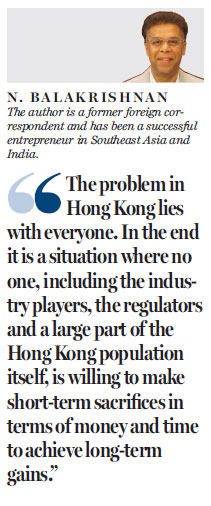Hong Kong may be at risk of losing out when it comes to financial innovation
Updated: 2016-06-17 08:14
By N. Balakrishnan(HK Edition)
|
|||||||||
Hong Kong boasts that it is an "international financial center" and in some respects it is. But in some ways it is losing out both to the East and West and also to the North. On the East, South Korea is about to give license to "internet only" banks which will not have bank buildings that customers can walk into for service. Everything will be done online, providing faster service for customers and saving expenses for banks.
On the West, a poor country such as India is in the process of giving all company directors and eventually everyone else a "Permanent Account Number" (PAN). The PAN will be like your mobile phone number and will belong to you but you are free to use the number to open and move bank accounts, similar to the way you change mobile phone networks. Part of the reason that banks in Hong Kong get away with poor service is that, as the marketing people say, bank accounts are "sticky" - meaning that it is not easy for customers to change accounts from one bank to another.
One of the main reasons bank accounts are sticky is because each bank has a different account number. Mobile phone accounts used to be "sticky" too until about 10 years ago when "number portability" was introduced in Hong Kong. The government regulators ordered all mobile phone operators to allow for portable numbers and the process was made easy. You could change numbers in a matter of minutes and competition increased among mobile phone companies; customers got cheaper and better services.
I think it is high time that the SAR's bank regulator, the Hong Kong Monetary Authority (HKMA), got rid of its convenient excuse of allowing "market forces to operate freely" and forced banks in Hong Kong to issue PANs for all bank accounts and to allow for quick "account portability".
It is also time for the HKMA to issue more bank licenses for "payment only" banks to facilitate easy payments from everything ranging from wet markets to taxi rides. In countries where such banks have been given "restricted" licenses, they are used for making small payments and are restricted from taking in big deposits or making big deposits. In Hong Kong, for example, a ceiling of HK$100,000 might be a good threshold. In the North, the Chinese mainland has now emerged as the largest market for online payments in the world - and in Hong Kong we have to dig into our pockets to get exact change for a taxi!
About 20 years ago, the South Korean financial sector was so backward - with the entire savings of the country being directed toward the heavy industrial sector - that the average Korean family could not even get a mortgage to buy a house! This was during a time when the average family in Hong Kong could not only get a mortgage easily but was able to speculate in any foreign currency they took a fancy to.
But the tables have turned now. The South Korean financial regulator has now become very progressive and proactive and, together with the industry, is moving the Korean financial sector into cutting-edge financial technologies, benefiting both the consumer and eventually the banks.
The Indian financial sector was so backward and antiquated in the late 1980s that when foreign investors were allowed in for the first time during that period, the Indian stock exchanges were still dealing with paper-based share certificates which had to be signed manually whenever they were transferred to a new owner, and what is more one had to lick and stick a "revenue stamp" each time a transfer was made.
That was then. Now at the Indian stock exchanges, it is routine for company shareholders to do "e-voting" on company matters. This is still not possible in Hong Kong. So the financial sectors in the East, West and North are all progressing at a much faster pace in terms of financial innovation than in Hong Kong, which at one time was far and away the leader of the pack.
The problem in Hong Kong lies with everyone. In the end it is a situation where no one, including the industry players, the regulators and a large part of the Hong Kong population itself, is willing to make short-term sacrifices in terms of money and time to achieve long-term gains.
Thus it is not fair to put all the blame on the HKMA for the current stagnation in financial innovation in Hong Kong. So what they say about each place getting the government it deserves is equally true when it comes to each society getting the regulator it deserves. In South Korea, in contrast, both the regulator and the people are manically focused on the future. More importantly, they will be willing to put up with short-term disruptions. So Hong Kong, please wake up and disrupt.

(HK Edition 06/17/2016 page10)